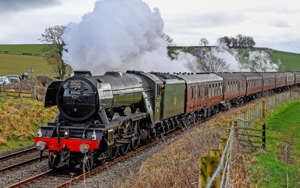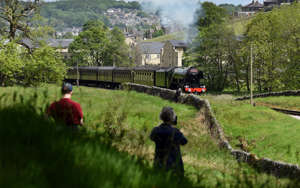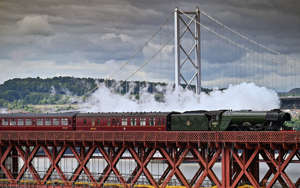Flying Scotsman could grind to a halt over modern door demands
 © Charlotte Graham for The Telegraph Flying Scotsman trains heritage railways locomotive transport future in doubt modern door system - Charlotte Graham for The Telegraph
© Charlotte Graham for The Telegraph Flying Scotsman trains heritage railways locomotive transport future in doubt modern door system - Charlotte Graham for The TelegraphThe future of the Flying Scotsman[1] is in doubt over the rail watchdog’s demands that modern door locks are fitted, The Telegraph can reveal.
Carriages hauled by the 100-year-old steam locomotive[2], run by West Coast Railways, are currently locked and unlocked using an old-fashioned bolt above each door.
However, train bosses are resisting pressure from the Office of Rail and Road[3] (ORR) to modernise the historic carriages[4] with central door locking systems, which the watchdog said would improve safety.
The Telegraph understands that West Coast Railways believes that the modern locking system would cost upwards of £1 million and is unnecessary as stewards man the doors on its charter trains[5] at all times.
The ORR argued that centrally controlled locking systems prevent passengers from opening doors when the platform is too short.
However, safety regulations[6] introduced in 2005 banned hinged door carriages unless they are fitted with central locking.
An exemption for slam-door carriages expired at the end of March and West Coast Railways is seeking a judicial review. But neither West Coast nor the ORR would confirm when it is likely to take place.
 © Provided by The Telegraph Flying Scotsman trains heritage railways locomotive transport future in doubt modern door system - Asadour Guzelian
© Provided by The Telegraph Flying Scotsman trains heritage railways locomotive transport future in doubt modern door system - Asadour Guzelian
The Flying Scotsman[7] is the world’s most famous steam locomotive. Built in 1923, it was officially the first locomotive to reach 100mph, and the first to circumnavigate the globe.
It also holds the world record for a non-stop run by a steam locomotive, set in 1989 with a 422-mile trip, achieved during its visit to Australia in 1989.
However, it has driven a succession of businessmen – Alan Pegler, Sir William McAlpine[8] and Tony Marchington – to financial ruin and was acquired by the National Railway Museum in 2004.
It is able to run at up to 75mph on Network Rail’s tracks[9], with routes and destinations including its former home, the East Coast Main Line[10], the Settle-Carlisle line, Great Yarmouth, Aberdeen, Portsmouth and Cardiff.
As well as the Flying Scotsman’s centenary programme[11] of rail tours, other charter trains will be heavily impacted if West Coast Railways is not granted a further exemption.
It also runs the Jacobite service between Fort William and Mallaig in Scotland – made famous by the Harry Potter film series – twice daily, while the Northern Belle dining train’s carriages are currently not compliant with the law either.
Other train companies[12] have been issued with short-term exemptions by the ORR in order to continue operating trains while carriages are being fitted with central locking.
 © Provided by The Telegraph Flying Scotsman trains heritage railways locomotive transport future in doubt modern door system - Jeff J Mitchell/Getty Images
© Provided by The Telegraph Flying Scotsman trains heritage railways locomotive transport future in doubt modern door system - Jeff J Mitchell/Getty Images
Belmond has an exemption until February 2025 for its luxury Twenties and Thirties Pullman carriages, while Vintage Trains’ exemption is set to run out on Nov 29 2024. Unlike West Coast Railways, both companies have pledged to fit the new locking system.
The ORR said it granted an exemption until June 30 2023 to allow West Coast Railways to “honour its bookings and to reflect the interests of its employees whilst its application for judicial review is determined”.
Jeremy Hosking, the chairman of Locomotive Services Limited, which fitted central door locking to its fleet well before the March 31 deadline, expressed his frustration at the current situation.
He said: “We feel a bit silly having complied with regulations that are not being enforced, but we may have to live with it.
“The ORR seems to be in a pickle in the face of what appears to be premeditated non-compliance, so its procrastination-oriented approach is perhaps understandable.”
If the Flying Scotsman is no longer permitted to use the mainline railway, it could still run on Britain’s much smaller network of historical “preserved lines”.
West Coast Railways was unavailable for comment.
Sign up to the Front Page newsletter for free: Your essential guide to the day's agenda from The Telegraph - direct to your inbox seven days a week.[13]
References
- ^ the Flying Scotsman (www.telegraph.co.uk)
- ^ the 100-year-old steam locomotive (www.telegraph.co.uk)
- ^ the Office of Rail and Road (www.telegraph.co.uk)
- ^ the historic carriages (www.telegraph.co.uk)
- ^ on its charter trains (www.telegraph.co.uk)
- ^ safety regulations (www.telegraph.co.uk)
- ^ The Flying Scotsman (www.telegraph.co.uk)
- ^ Sir William McAlpine (www.telegraph.co.uk)
- ^ on Network Rail’s tracks (www.telegraph.co.uk)
- ^ the East Coast Main Line (www.telegraph.co.uk)
- ^ the Flying Scotsman’s centenary programme (www.telegraph.co.uk)
- ^ Other train companies (www.telegraph.co.uk)
- ^ Sign up to the Front Page newsletter for free: Your essential guide to the day's agenda from The Telegraph - direct to your inbox seven days a week. (www.telegraph.co.uk)